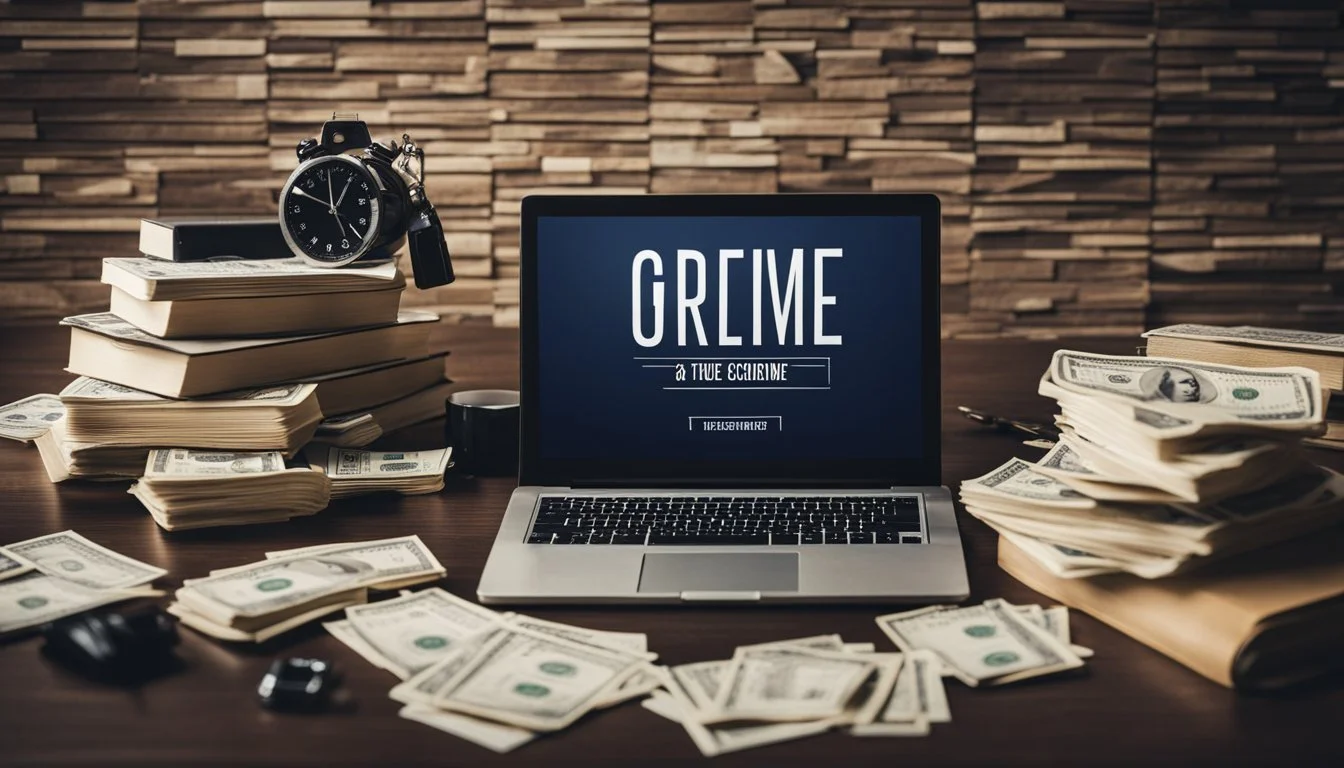7 True Crime Documentaries About Student Loan Scams in Virginia
Shocking Real-Life Stories
Student loan scams have become a pressing issue, particularly affecting students in Virginia. The deceptive practices and fraudulent schemes leave many young individuals burdened with debt and compromised futures. These documentaries provide a comprehensive look into the mechanisms behind these scams and the impact on the victims.
Viewers will gain insight into the ways student loan frauds are executed and the systemic failures that allow such deceptions to flourish. The featured documentaries offer real cases and personal stories that highlight the severity of this crisis, aiming to inform and protect future students and their families.
1) The Scholar Hustle (2024)
"The Scholar Hustle" is a gripping documentary released in 2024 that exposes the sinister world of student loan scams, particularly those targeting individuals in Virginia.
This film delves into the tactics scammers use to prey on vulnerable students and graduates, often leaving them in financial ruin. By highlighting real-life cases, it showcases the emotional and financial toll these scams take on victims.
With testimonies from former students, financial experts, and law enforcement officials, "The Scholar Hustle" provides a comprehensive overview of the issue. It sheds light on the sophisticated methods used by fraudsters to appear legitimate.
The documentary also explores efforts by authorities and advocacy groups to combat these scams and offer resources for victims. It serves as both a cautionary tale and a call to action.
For those interested in learning more about this powerful film, additional information can be found on IMDB.
2) Forged Futures
"Forged Futures" (2023) dives into the dark world of student loan scams affecting young adults in Virginia.
The documentary highlights real-life cases of borrowers targeted by fraudulent programs promising debt relief.
It exposes how scammers use sophisticated techniques to appear legitimate.
Victims often receive calls from people claiming to be from official organizations like Federal Student Aid or the Department of Education.
Scammers use personal information to gain trust, making their schemes more convincing.
"Forged Futures" also sheds light on the psychological impact on victims.
Borrowers discuss their harrowing experiences and the financial and emotional toll of falling prey to these schemes.
Through interviews with experts, the film offers insights into the regulatory loopholes that enable these scams to flourish.
The documentary features commentary from law enforcement and consumer protection agencies working to combat these crimes.
Viewers gain a deeper understanding of the systemic issues contributing to the rise of such scams.
For more information, visit IMDB-Forged Futures.
3) Loan Lies Exposed
Loan Lies Exposed (2019) explores the deceptive practices surrounding student loan scams in Virginia. This documentary provides an in-depth analysis of how scammers deceive vulnerable individuals, exploiting their dire financial situations.
The film highlights real-life cases, where victims were lured with promises of loan forgiveness and lower interest rates, only to find themselves in more debt.
Interviews with victims and experts reveal the intricacies of these scams. They expose the sophisticated methods used by scammers to gain trust and manipulate borrowers into signing misleading agreements.
Through these revelations, viewers gain a clear understanding of the emotional and financial toll on the victims.
This documentary also examines the legal landscape, showcasing the efforts of law enforcement and advocacy groups in combating these fraudulent activities.
For more details: Loan Lies Exposed (2019) IMDb.
4) Education Extortion
"Education Extortion" (2022) showcases in depth the manipulations and tactics used by scammers to exploit students burdened with hefty loan debts. The documentary reveals how fraudsters deploy sophisticated schemes to coerce students into paying illegitimate fees or providing sensitive information.
The film highlights true stories of victims who were lured by promises of immediate loan forgiveness or reduced payments. It explores how these scams often originate from seemingly official communications, enticing students to trust and act quickly.
By analyzing various cases, the documentary emphasizes the psychological impact on students who find themselves trapped in these fraudulent schemes. It uncovers the challenges victims face in seeking justice and recovering from financial losses.
Expert interviews provide insight into the regulatory gaps exploited by scam artists, as well as the efforts being made to increase student awareness and protection. "Education Extortion" serves as a crucial educational tool for students and policymakers alike.
For more details, you can refer to the IMDB page for this documentary.
5) Degrees of Deceit
"Degrees of Deceit" (2023) is a revealing documentary that explores the dark side of higher education finance in Virginia. It dives into the intricate world of student loan scams, exposing fraudulent schemes that prey on vulnerable students seeking to better their lives.
The film traces real-life stories of victims who were lured into taking out hefty loans based on false promises. Through interviews with former students, investigative journalists, and legal experts, the documentary sheds light on how these scams operate.
"Degrees of Deceit" also examines the systemic issues that allow such fraudulent activities to thrive. It looks at the role of predatory lenders, deceitful college representatives, and regulatory failures.
The documentary calls attention to the long-term consequences for the victims, including crippling debt and damaged credit scores. It serves as a wake-up call for policymakers and educational institutions to implement stronger protections for students.
For more details about the film, visit IMDb.
6) Phantom Promises
This documentary reveals the intricate web of deceit spun by fraudulent student loan companies in Virginia. Phantom Promises (2023) explores how these companies preyed on vulnerable students and their families, promising low-interest rates and easy repayment plans that were too good to be true.
Victims share their stories of financial ruin and emotional distress, highlighting the manipulative tactics employed by these scammers. The film exposes the lengths to which these fraudsters went to appear legitimate, including fake accreditation and glowing online reviews.
Law enforcement officials and financial experts provide insights into how these scams operated and the challenges involved in shutting them down. Phantom Promises serves as a sobering reminder of the importance of due diligence and awareness in financial dealings.
7) Student Debt Swindle
"Student Debt Swindle" (2024) is a gripping documentary that explores the rampant fraud in the student loan industry within Virginia. The film takes a hard look at how unsuspecting students and their families were deceived by fraudulent companies promising debt relief.
The documentary features first-hand accounts from victims who were lured by seemingly legitimate offers. They shared how their situations worsened after entrusting their finances to these scammers.
Interviews with law enforcement and consumer protection agencies shed light on efforts to crack down on these fraudulent schemes. The film emphasizes the legal battles and ongoing investigations that aim to bring justice to the affected.
By presenting detailed case studies, "Student Debt Swindle" highlights the widespread impact of these scams on borrowers' lives. The personal stories, coupled with expert analysis, reveal the emotional and financial toll taken by these deceitful practices.
For more information on this documentary, visit IMDb Wikipedia.
Overview of Student Loan Scams in Virginia
Student loan scams in Virginia have evolved over time, employing various tactics to exploit vulnerable borrowers. Understanding the historical context and common tactics used can help individuals better safeguard themselves.
Historical Context
In Virginia, student loan scams have a history dating back to the early 2000s. As the cost of higher education increased, more residents became targets for fraudulent schemes promising loan forgiveness or reduced payments.
State agencies often reported surges in complaints, particularly during economic downturns when borrowers were desperate for financial relief.
The advent of federal loan forgiveness programs has also been a fertile ground for scams. Fraudsters have exploited changes in legislation to deceive borrowers, pretending to offer solutions that only result in financial loss.
Regulatory bodies have periodically launched awareness campaigns, yet the problem persists.
Common Tactics Used
Scammers often contact borrowers through phone calls, emails, or social media, claiming to be affiliated with reputable organizations. They might know details about the loan, such as the balance or the lender's name, to gain trust.
Pressure tactics are common, urging victims to act immediately to qualify for supposed benefits.
Upfront fees are another red flag. Legitimate loan forgiveness programs do not charge advance fees.
Scammers may also promise immediate loan forgiveness and request private information, like Social Security numbers or bank details, aiming to steal both money and identities.
Awareness and skepticism are crucial in preventing these scams. By recognizing these warning signs, individuals can protect themselves from falling victim to fraudulent schemes.
Case Studies of Student Loan Scams
Student loan scams have had profound impacts on victims, leading to significant financial and emotional distress. Investigations into these scams have employed various techniques to uncover fraudulent schemes.
Impact on Victims
Victims of student loan scams in Virginia often face dire financial consequences. Many lose their life savings, experience damaged credit scores, and struggle with identity theft. For instance, scammers may falsely claim affiliation with the Federal Student Aid (FSA) or the Department of Education, asking for personal details and fees to process bogus loan forgiveness.
Emotional tolls are significant as well, with victims feeling betrayed and anxious about their financial futures. Those targeted are often already struggling with loan payments, making the fraudulent promises of relief particularly devastating. This can lead to increased stress and mental health issues.
Legal implications also arise. Victims often incur additional legal costs while trying to reverse the fraudulent transactions and clear their names. The long-term financial instability can strain personal relationships and lead to broader socioeconomic issues.
Investigative Techniques
Investigators utilize various methods to detect and dismantle student loan scams. Key techniques include surveillance, digital forensics, and undercover operations. These efforts aim to trace the origins of fraudulent communications and track the perpetrators.
Collaboration with federal and state agencies is crucial. Agencies like the FBI and local law enforcement work together to pool resources and share information, making it easier to identify and prosecute scammers. Public awareness campaigns are also employed to educate potential victims about the risks and signs of loan scams.
Technological tools play a vital role. Investigators use software to analyze patterns in scam calls and emails, identifying common tactics and linking different scams to larger criminal networks. This approach helps in building strong cases against the fraudsters.
Understanding these case studies offers insight into the severe effects on victims and the sophisticated methods used in investigations.
Preventative Measures and Legal Recourse
In combating student loan scams, understanding the roles of regulatory agencies and personal protective steps is crucial. Both aspects can significantly mitigate the risk of becoming a victim of fraud.
Regulatory Agencies
Several regulatory agencies oversee the legitimacy of student loan services and investigate fraudulent activities. The Federal Trade Commission (FTC) plays a significant role in protecting consumers from scams and deceptive practices. They regularly issue consumer alerts and maintain a database of reported scams.
The Department of Education enforces regulations and provides information about legitimate loan forgiveness programs. Additionally, the Consumer Financial Protection Bureau (CFPB) offers resources and handles complaints related to student loans. These agencies coordinate efforts to shut down fraudulent operations and prosecute offenders. Seeking information from these trusted sources can help you avoid falling victim to scammers.
Steps to Protect Yourself
Protecting yourself starts with being vigilant and informed. Firstly, never share personal or financial information over the phone or online unless you are certain of the recipient's identity. Always verify the identity of anyone contacting you about loan forgiveness or repayment plans.
Regularly check your loan status through official portals like the Federal Student Aid website. Be wary of unsolicited offers and promises that seem too good to be true, such as immediate loan forgiveness. Additionally, monitor your credit report for any unauthorized activity.
If you suspect a scam, report it immediately to the FTC, Department of Education, or CFPB. Keeping records of all communications and transactions related to your student loans is also essential. This documentation can be crucial if you need to take legal action or file a complaint regarding fraudulent activities.











